

Share
25th March 2017
11:23am GMT

“The horrific struggle to establish a human self results in a self whose humanity is inseparable from that horrific struggle…Our endless and impossible journey towards home is in fact our home. “ David Foster Wallace
“The emotion and the good memories will carry them along,” one man waiting by the graveside at City Cemetery above Derry insisted.
And maybe it was also important. On a day freighted with symbolism, maybe it was right that there was one more long winding journey to the top of the hill overlooking Derry.
Eventually the funeral party arrived. Five hours after leaving Martin McGuinness’s home in the Bogside, the coffin of the husband, father, grandfather, IRA commander, Sinn Fein politician and deputy First Minister settled at this resting place where the crowd waiting was swelled by the thousands who had followed from the church.
“Blessed are the peacemakers,” said the banner which followed Martin McGuinness into the graveyard below Creggan. “He did not go to War. War came to him,” it explained if anyone was troubled by the contradictions in this life of great complexity.
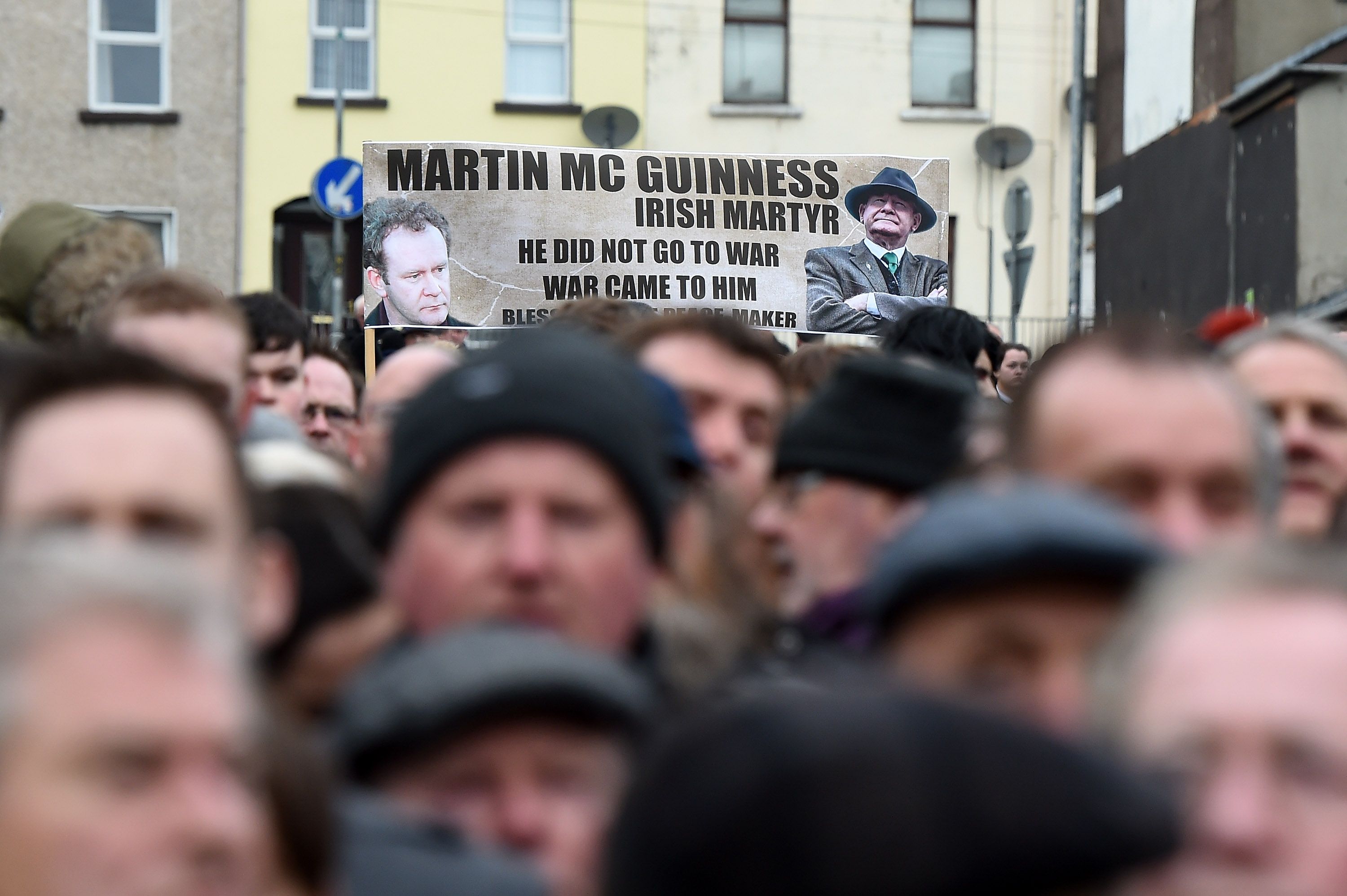 In the cemetery, there were fewer people who would have been troubled. “When you seek a monument for the man who brought us here today, look around you,” Fr Michael Canny had said earlier as he looked around St Columba’s Church full of those who had brokered a peace, benefitted from it or felt it was right to acknowledge the transformation Martin McGuinness had helped to bring. “By your presence, you are his monument.”
In the cemetery, there were fewer people who would have been troubled. “When you seek a monument for the man who brought us here today, look around you,” Fr Michael Canny had said earlier as he looked around St Columba’s Church full of those who had brokered a peace, benefitted from it or felt it was right to acknowledge the transformation Martin McGuinness had helped to bring. “By your presence, you are his monument.”
In the cemetery, at the republican plot, men approached the cordon that was keeping the crowd from the graveside. Some were let in, some like a man wearing a broad-brimmed fedora who turned out to be the Cuban ambassador, were greeted warmly but told to wait to one side.
If the day was a stunning and moving testament to the peace McGuinness had achieved, the graveside ceremonies were a reminder of why he retained the admiration of committed republicans and the hostility of those who couldn’t forgive.
Gerry Adams’ words that “Martin McGuinness was not a terrorist, Martin McGuinness was a freedom fighter” were greeted by a primal roar. The Englishman I had met earlier outside a sandwich shop in the city who had referred to the years of violence as a “necessary transition” might have agreed.
Yet Adams also asked those gathered to “reach out” to their unionist neighbours, and while this plea was received essentially in silence, once again it felt important that, at this symbolic moment, Adams was making it.
“I hate stooping to symbolism,” Noel Coward once said, but Northern Ireland depends on symbols as it strives for normality and in Derry on Thursday, symbols were everywhere.
While all that Martin McGuinness achieved had been recognised during the week, and was underlined by the presence of Bill Clinton, Enda Kenny, Arlene Foster and those from all communities, this was a funeral which was as much about the future as the past.
Many of those who reflected on Martin McGuinness’s journey during the week mentioned his humanity and generosity. Others found those terms laughable for a man who had shown no remorse for the hideous murders committed by the IRA.
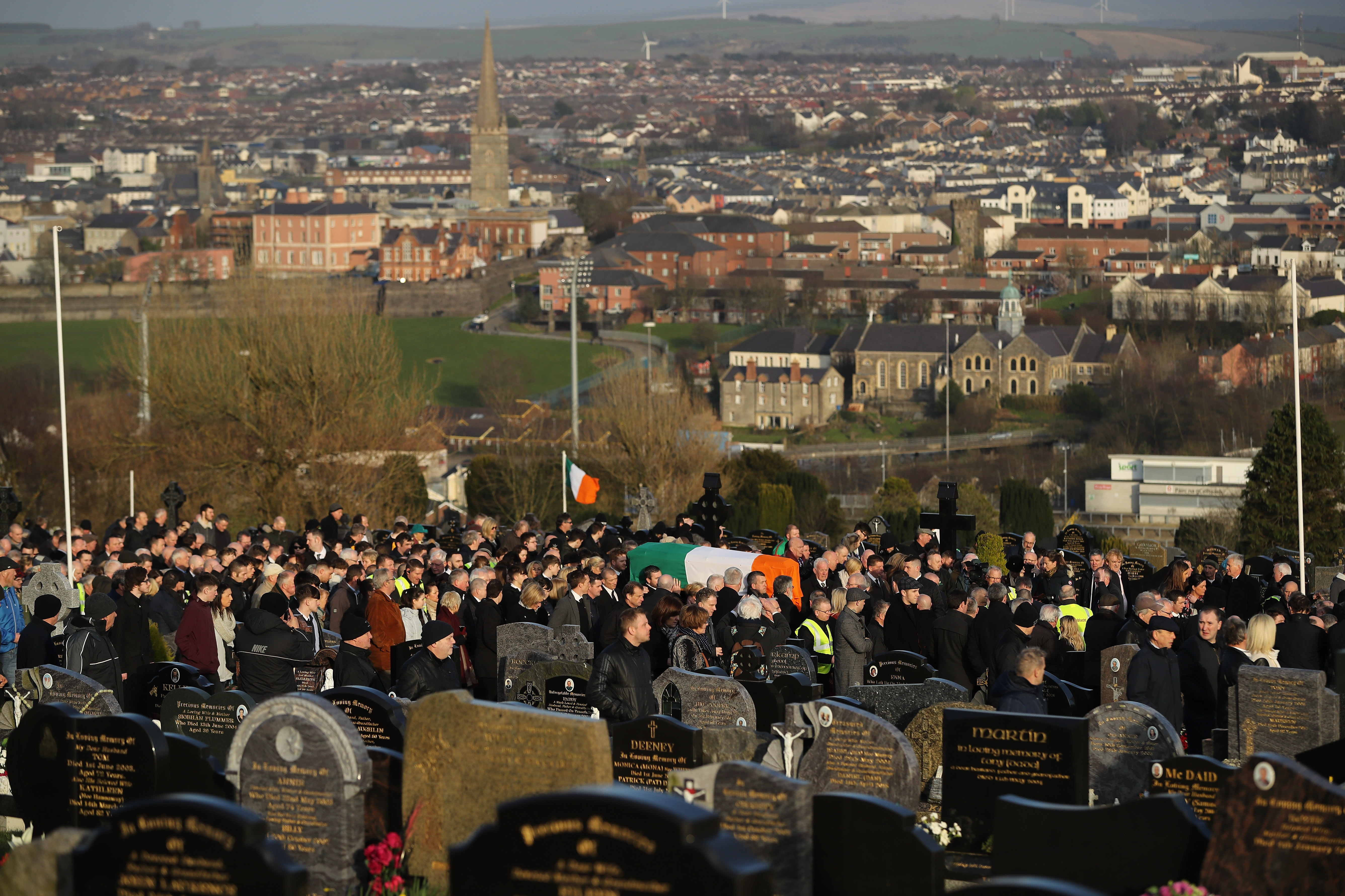
McGuinness had not changed his worldview, just his strategy, his most implacable foes said, a sentiment which was repeated by his most fervent admirers.
But if there was no remorse, peace was an amend and one which may, had he lived, led to a fuller expression of the apologies many felt were lacking.
“Reconciliation, I have always believed, is the next vital stage of the peace process,” he said in January. His death makes that harder for those who follow him because of the knowledge McGuinness takes with him as well as his ability to build a future with others.
Martin McGuinness, as had been stated by many, never lost his commitment to a United Ireland but the tragedy of his death is that he had a gift for finding common ground which others might not share.
McGuinness might have discovered there were limits to the extent he could persuade people of his transformation, certainly electorally in the south. Reading the tributes from those who worked with him, it did seem that if he had been able to meet everybody in Britain and Ireland personally, he could have made them believe in his good intentions.His hinterland was important in that. Unlike some republicans, McGuinness didn’t feel the need to pull on a GAA jersey and stand outside Croke Park in order to make a statement about his identity. If he put on a jersey, he did it because he cared about sport and had an interest which was not restricted by the limiting and isolating force that all nationalisms are. He supported Manchester United and followed cricket and these things became important as he searched for common ground.
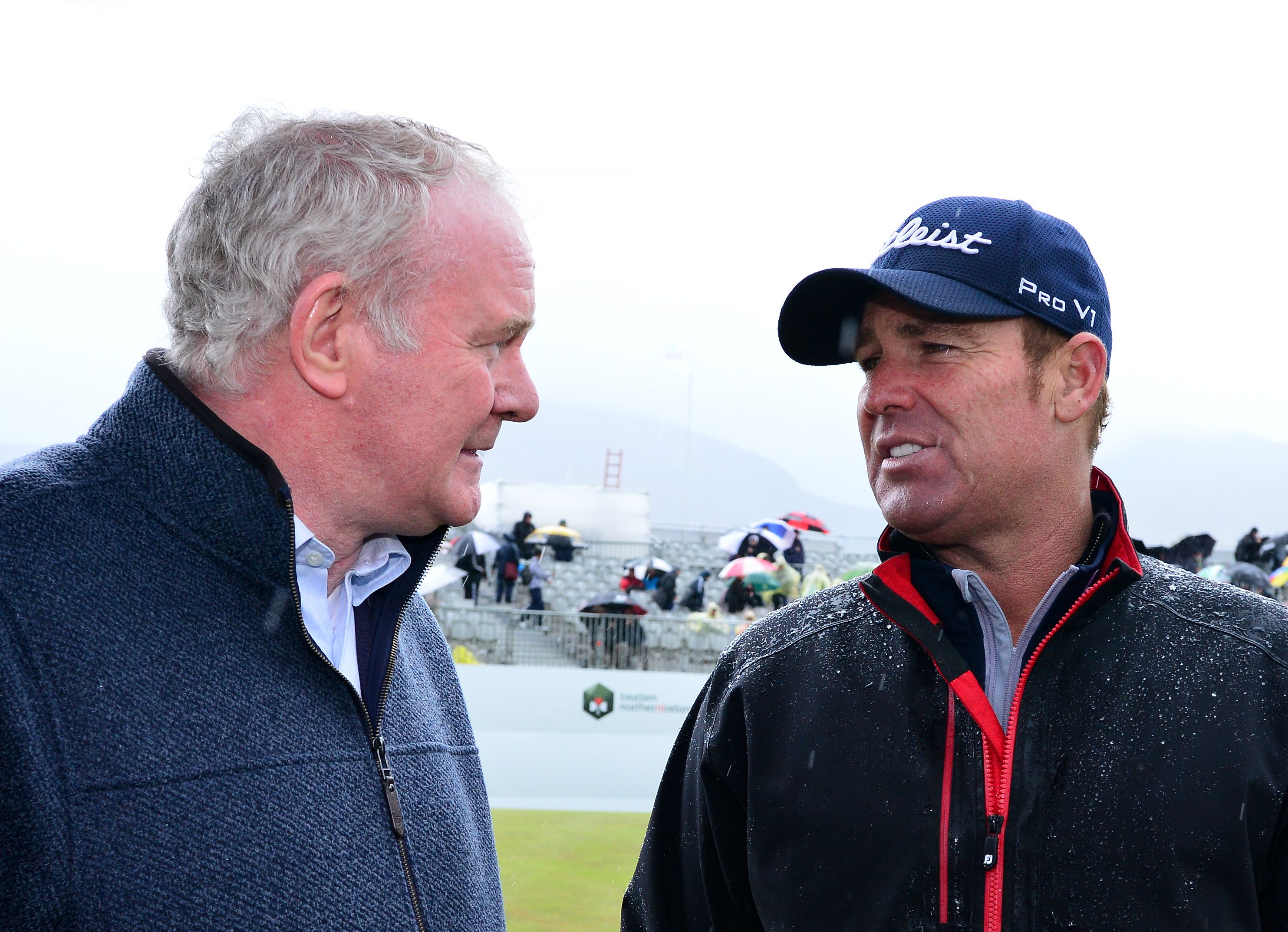
The seriousness of purpose he possessed gave him his integrity, even if as Jonathan Franzen has pointed out, “integrity is a neutral value. Hyena is pure hyena”.
In Long Tower, they spoke about the complex man. Adams might have acknowledged that, but there was talk also at the graveside of how there were not two sides to McGuinness, just one side which never lost sight of the pursuit of the true goal of Irish republicans.
This may be true or it may simply be necessary to believe it was true, even if it is hard to think that anyone has only one side to them.
In Long Tower church, the reading from Ecclesiastes seemed to sum it up with its words about, "A time for killing, a time for healing . . . a time for loving and a time for hating", even if some might have added that there also appeared to be a time for a brutal and sadistic campaign of terror.
Yet on Thursday, the extraordinary thing was how so many had moved beyond that, helped by the words and actions of Martin McGuinness. David Trimble, whose Nobel speech about how Northern Ireland was a "cold house for Catholics' was a brave and important gesture from unionists, acknowledged that McGuinness had been "indispensable" in creating peace.
Perhaps we had been fortunate that a man like McGuinness was leading the IRA and was able to recognise that the time for killing was at an end. The people who had suffered much were fortunate that McGuinness, whose humanity had deepened because of that horrific struggle which he gave so much to, including so much of what was horrific, was able to lead the peace.
But now there was a time to think about the future.
“No border. No Brexit,” read the stickers on lampposts around Derry and the insanity of the UK’s vote to leave the EU has provided impetus to those who believe passionately in a United Ireland as well as those who simply see the dangers in restoring a border which has effectively disappeared.
For the committed nationalist, this offers another opportunity to become excited at the inevitability of a united Ireland.
But what is this Ireland? Too often, the nationalist voice north and south delights in the idea that unionism has no place left to go. “They are tied to a country that doesn’t want them,” they will say, ignoring whatever similar ambivalences that may exist in the minds of many in the south about Northern nationalism.
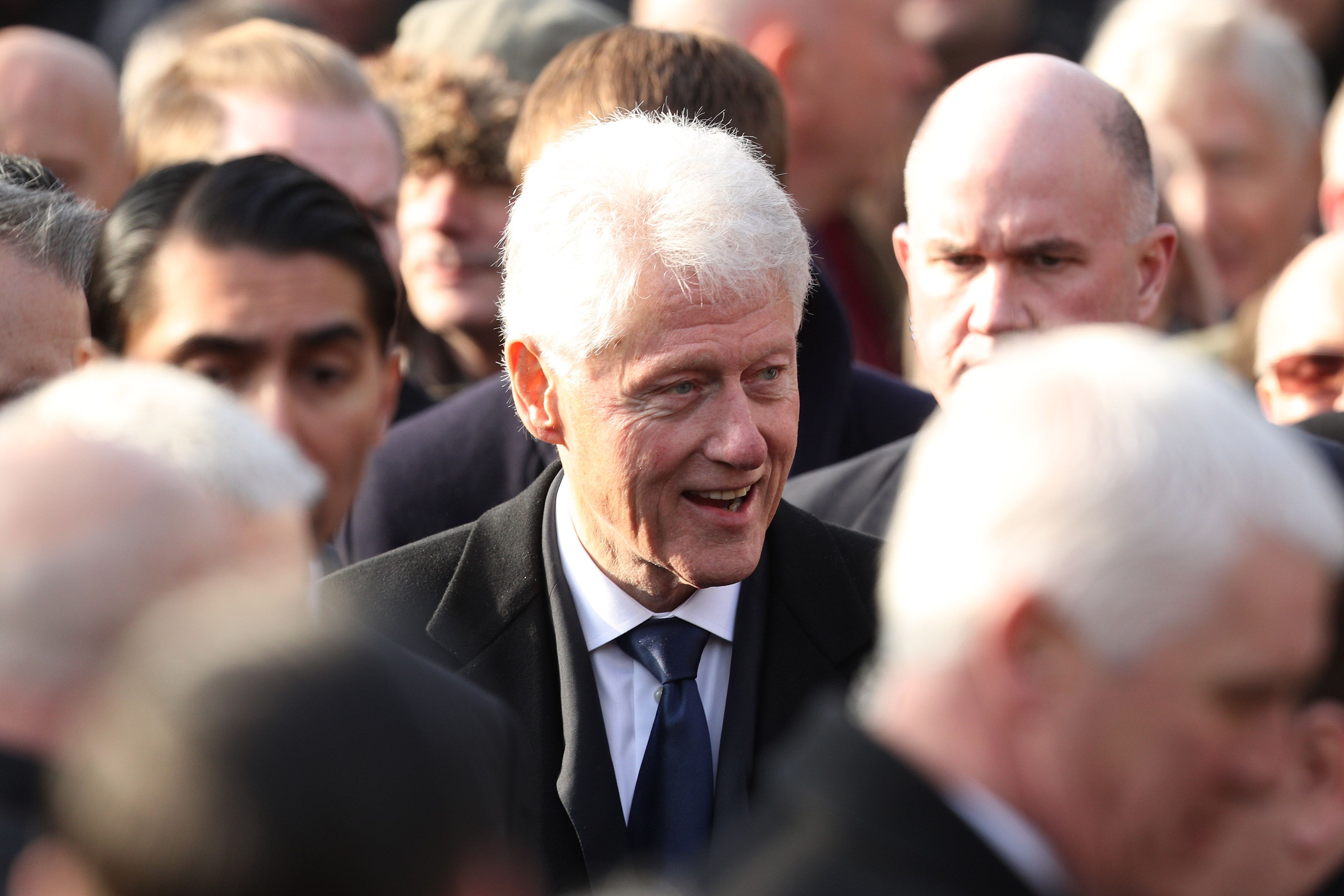
When some suggest that the anthem or tricolour could be replaced as an agreed Ireland, others baulk, so sure, as nationalists of all persuasions are, that their cultural hallmarks are not only vital, but reflective of a way of life superior to those that it opposes.
Neither Mary Lou McDonald nor Michelle O’Neill were impressive on the platform at the graveside, but maybe that is the point. If Mary Lou let out a tribal roar about a freedom fighter she would be undermining her own usefulness to Sinn Fein.
Yet, whoever takes Sinn Fein forward has to be able to persuade the men and women who were there that their goals remain the same while being able to communicate something different to the communities who were present on Thursday.
They will remember the day Martin McGuinness was buried as another day when anything seemed possible. To stand outside the church as the sun finally warmed up the street and listen to Bill Clinton soothe and inspire as only Bill Clinton can with his oratory was a moment when all seemed achievable. Clinton made it feel as if everything was going to be all right and in this church above the Bogside, he reminded us how far Martin McGuinness had travelled without ever leaving home.
Shortly before the funeral ended, a woman wearing a high-vis jacked with ‘Yes to Equality’ on it had moved through the crowd with a megaphone. She asked people to step off the road as they needed to clear the way for the guard of honour. When this was done, a man walked down the road carrying a plastic bag. In it, there were tricolour armbands. Men jogged up to him to get one, others he sought out and they all proudly put them on their arms as they prepared to line the final leg of Martin McGuinness’s journey.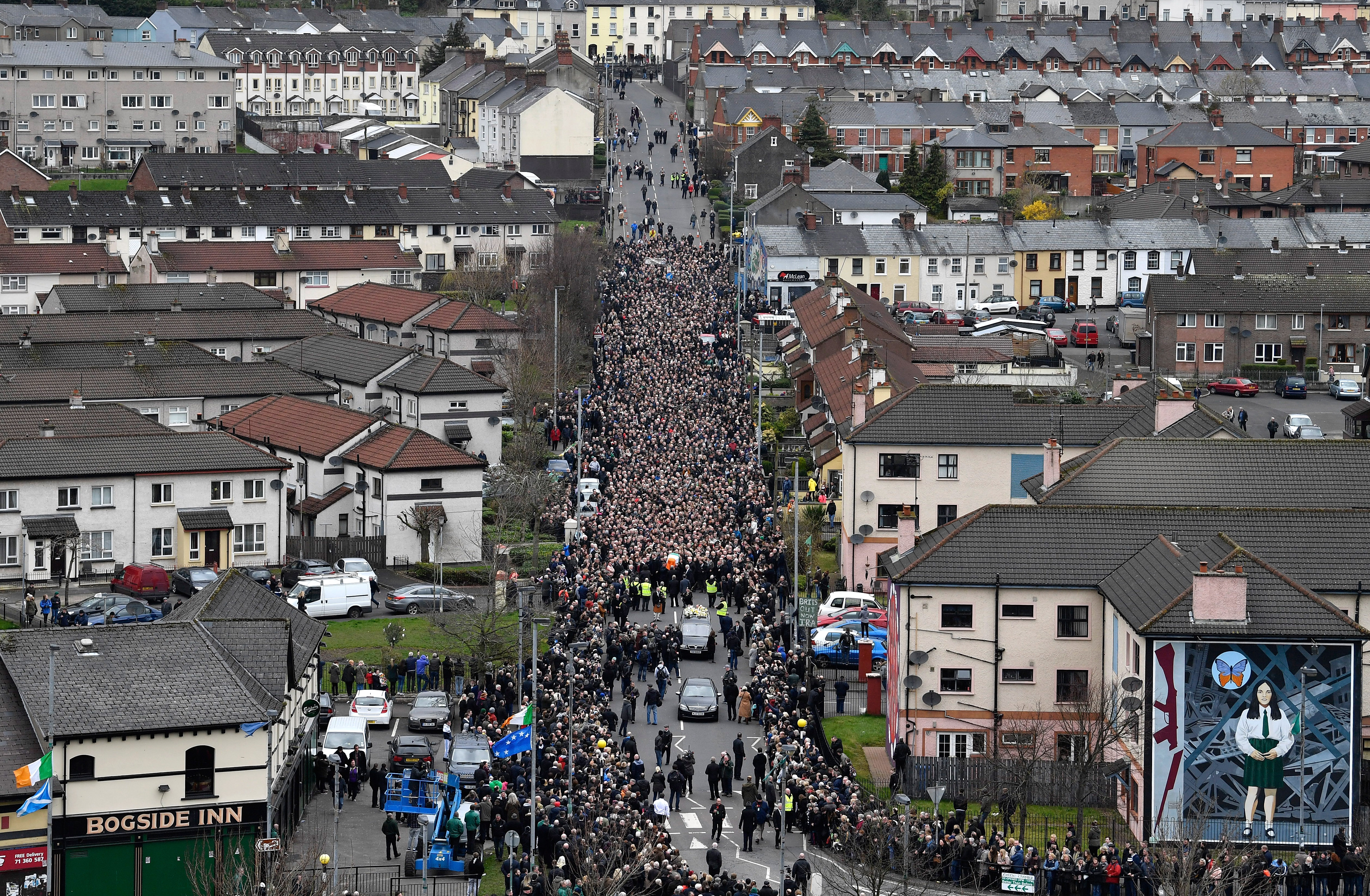
The world, Joan Didion wrote, is divided into the “bereaved and the unbereaved”. McGuinness was responsible for much bereavement, but he developed an understanding of grief which informed much of what he did in the latter stages of his life when the horrific struggle and the humanity were joined together.
At the graveside as the sun set, Gerry Adams talked about a life less ordinary. For better and for worse, nobody could dispute that. But there was something else, something that was clear as the crowd dispersed and the day passed without a moment’s rancour or bitterness. McGuinness had been among those who achieved something which once had seemed impossible: he had brought normality, or a version of it, to Northern Ireland. The ordinary had become extraordinary. In the stillness in the cemetery nothing seemed more remarkable than that.
Explore more on these topics:

Politics | Joe.ie
politics